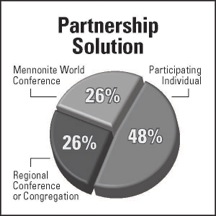by Mennonite Heritage Center staff
In 1953, at the end of the Korean War, Mennonites opened a vocational school in Kyungsan, South Korea to educate homeless orphaned boys. Mennonites in the United States were asked to “adopt” a boy and provide financial and emotional support for the adoptee.
Willis and Mary Lederach, who attended Salford Mennonite Church (Harleysville, Pa) decided to support Kim Jong Sub, now known as Byung Dong Kim. For more than a decade, Mary faithfully wrote to Kim Jong Sub, and he considered her his American mother.

After Kim Jong Sub graduated from the vocational school, he considered enrolling in a seminary. In 1964, Willis and Mary sent him a Greek New Testament with an English translation. Mary inscribed the first page of the New Testament with their names and the date and added, “With much love to our Jong Sub from your American parents.”
Kim did not become a seminarian, but went on to have a successful career in business.
For Koreans, it’s important to know your familial heritage. During Kim’s young adult life, he attempted to find his birth family, and eventually he changed his name to Byung Dong Kim, believing that name more clearly reflected his authentic self.
Mary Lederach continued to write to Kim after he left the vocational school, but eventually they lost contact. In 1986, during a vacation to the United States, Kim made inquiries about the Lederachs and was put in touch with their oldest son, Paul, who was living in Scottdale, Pennsylvania. It was a great disappointment to Kim and to the Lederachs that Mary and Willis had died prior to his visit.
Since then, Byung Dong Kim and his wife have visited the Lederach family numerous times. Their son, Dae Wee Kim, graduated from Goshen College and then spent two years in Lansdale, Pennsylvania working for accounting firm Baum, Smith & Clemens. Dae Wee received an MBA at Notre Dame University and now lives in Northern New Jersey, where he is a CPA. He is married, and has two children. He and his family are faithful members of a Korean church in their community.
After 50 years, the Greek-English New Testament that Mary and Willis sent Kim Jong Sub came back to Harleysville: In September, Dae Wee brought this precious book to the Mennonite Heritage Center to be added to the Mary Mensch Lederach and Willis Kulp Lederach collection in the MHC archives. An inscription written to Mary and Willis’s daughter, Mary Jane Lederach Hershey, says, “To Sister Jane, I have Dae Wee bring this precious Book to you. Can be part of what you are collecting for Mother Mary Lederach, July 2, 2013, Byung Dong Kim (Kim Jong Sub) Republic of Korea.”
Two countries miles apart, connected by a book whose theme of loving one’s neighbor has forever entwined two extended families in profoundly unspeakable ways: A story of faithfulness, love and grace.












